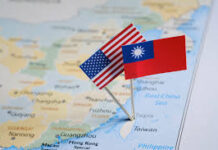In a significant escalation of the US-China trade and technology war, the Chinese government has announced a ban on the export of key materials used in semiconductor manufacturing to the United States. This move comes just a day after Washington unveiled fresh restrictions aimed at crippling China’s ability to produce advanced chips, intensifying tensions between the world’s two largest economies.
China’s Strategic Response
China’s Ministry of Commerce stated that the restrictions would target critical components and materials vital for producing semiconductors, though it has yet to specify which items will be included in the ban. Experts speculate that rare earth elements and specialized chemicals—areas where China holds a dominant global market share—could be among the restricted exports.
Rare earths like gallium and germanium, essential for semiconductor production and other high-tech applications, are areas where China wields significant influence. Earlier this year, Beijing already tightened controls on gallium and germanium exports, signaling its willingness to weaponize its dominance in these resources in response to US policies.
US Restrictions on China’s Advanced Chipmaking
The new US measures, announced by the Biden administration, aim to block China’s access to advanced semiconductor technologies critical for artificial intelligence (AI) and military applications. The rules expand restrictions on US companies and global suppliers that use American technology, preventing them from selling advanced chips and manufacturing equipment to Chinese firms.
The move is part of a broader strategy to slow China’s progress in AI and supercomputing, areas deemed vital to national security. It also seeks to curb Beijing’s ability to integrate advanced chips into next-generation weapons systems.
Implications for the Semiconductor Industry
The semiconductor sector is already strained due to pandemic-related disruptions, and the tit-for-tat measures threaten to further destabilize global supply chains. China and the US are deeply interconnected in the chipmaking process, with each side playing a critical role.
- For China: The ban on US chipmaking technology could hamper its ambitions to become a leader in AI and advanced computing. However, the export ban on raw materials and components could serve as a leverage point, as US chipmakers rely on Chinese-sourced materials.
- For the US: Restrictions on Chinese exports could disrupt the supply of critical inputs, forcing American manufacturers to seek alternative sources—potentially at higher costs and over longer timeframes.
Global Repercussions
The escalating trade war has sent shockwaves through the global tech industry. Countries like South Korea, Taiwan, and Japan, which are key players in the semiconductor supply chain, may face indirect impacts as tensions between the US and China ripple through the market.
The restrictions could also accelerate efforts by both nations to achieve self-sufficiency in semiconductor manufacturing. China has been investing heavily in domestic chip production through its “Made in China 2025” initiative, while the US has poured billions into its CHIPS Act to bolster local manufacturing capacity.
The Broader Geopolitical Context
The semiconductor battle underscores the strategic importance of advanced technology in the 21st century. Both nations view dominance in chipmaking as a cornerstone of their economic and military power.
The latest moves are likely to deepen divisions, making it harder to find common ground on broader trade or geopolitical issues. Analysts warn that this tech cold war could evolve into a prolonged and costly standoff, with consequences extending far beyond semiconductors.













































